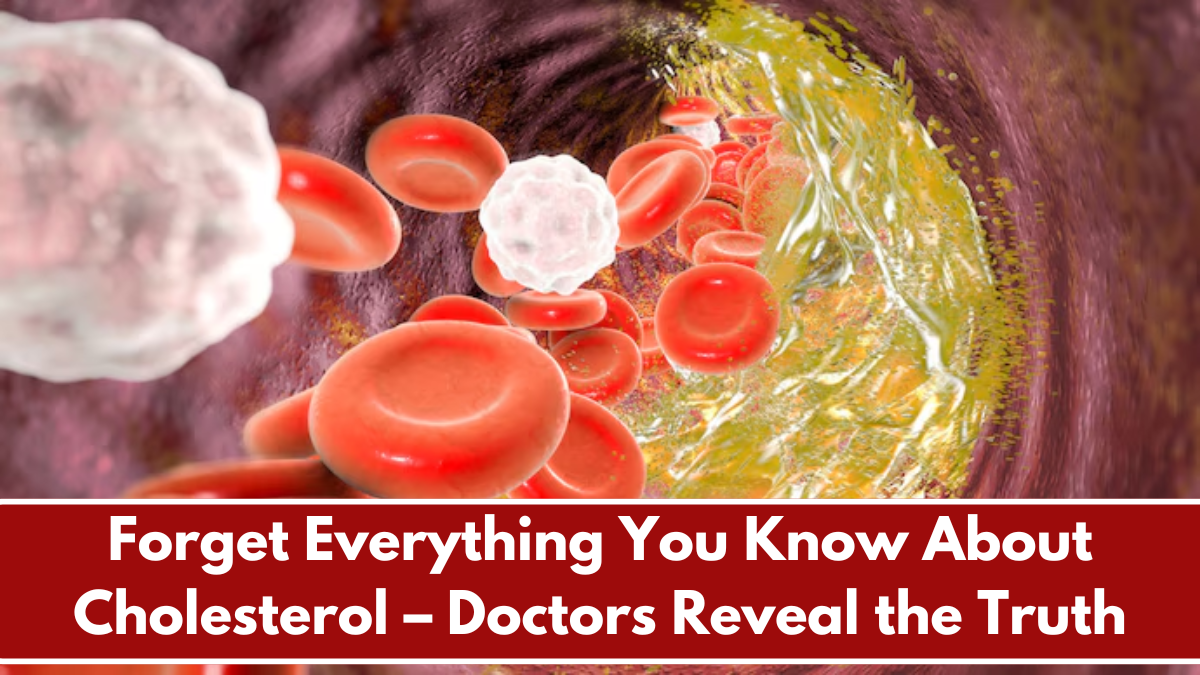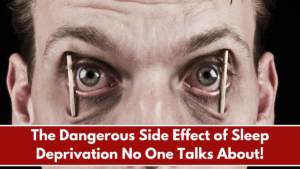For decades, we’ve been told that cholesterol is the enemy—a major cause of heart disease, clogged arteries, and strokes. Health experts, doctors, and dietitians have preached the dangers of high cholesterol, urging people to avoid foods like eggs, butter, and red meat. Low-fat diets and cholesterol-lowering medications have been widely promoted as the key to heart health.
But what if everything you thought you knew about cholesterol wasn’t entirely true?
Recent research has challenged conventional wisdom, revealing surprising truths about cholesterol, its role in the body, and whether it’s as dangerous as we’ve been led to believe. Some doctors now argue that cholesterol isn’t the villain we once thought, and that our obsession with lowering it might be doing more harm than good.
In this article, we’ll uncover the real story behind cholesterol, explore why it’s essential for health, and explain why some cholesterol-lowering strategies may be misguided. If you’ve been told to fear cholesterol, it’s time to rethink what you know.
What Is Cholesterol, and Why Do We Need It?
Most people associate cholesterol with heart disease, but in reality, cholesterol is a vital substance that the body needs to function properly. It is a type of lipid (fat) that is found in every cell in the body and plays a crucial role in:
- Building cell membranes – Cholesterol is essential for cell structure and stability.
- Producing hormones – The body uses cholesterol to make testosterone, estrogen, and cortisol.
- Aiding digestion – The liver uses cholesterol to produce bile, which helps digest fats.
- Supporting brain function – The brain contains a significant amount of cholesterol, which is necessary for memory, learning, and nerve function.
The body actually produces most of the cholesterol it needs in the liver—about 75% of the cholesterol in your body is made naturally, while only 25% comes from food. This means that dietary cholesterol has far less impact on blood cholesterol levels than once believed.
So, if cholesterol is essential, why has it been blamed for heart disease?
The Truth About “Good” and “Bad” Cholesterol
You’ve probably heard of LDL (low-density lipoprotein) and HDL (high-density lipoprotein) cholesterol, commonly referred to as “bad” cholesterol and “good” cholesterol.” But the reality is more complex.
- LDL Cholesterol (“Bad” Cholesterol?) – LDL carries cholesterol from the liver to the cells. If there’s too much LDL, it can deposit in artery walls, contributing to plaque buildup and increasing the risk of heart disease. However, not all LDL is harmful—small, dense LDL particles are the real problem, whereas larger, fluffy LDL particles are relatively harmless.
- HDL Cholesterol (“Good” Cholesterol?) – HDL helps remove excess cholesterol from the bloodstream and transports it back to the liver for disposal. Higher HDL levels are generally associated with a lower risk of heart disease.
However, new research suggests that simply focusing on LDL vs. HDL isn’t enough. Some people with high LDL have no heart problems, while others with low LDL still develop heart disease. The key is not just cholesterol levels, but inflammation, diet, and overall lifestyle.
Does High Cholesterol Really Cause Heart Disease?
For years, high cholesterol was blamed as a primary cause of heart disease. But is cholesterol truly the culprit?
Recent studies suggest that cholesterol alone may not be as dangerous as once thought. Instead, the real cause of heart disease may be chronic inflammation.
- Inflammation, not cholesterol, damages arteries – Studies have shown that inflamed blood vessels are more prone to plaque buildup, regardless of cholesterol levels.
- Many people with heart disease have “normal” cholesterol – Research has found that nearly half of heart attack patients have normal or low LDL cholesterol.
- Cholesterol-lowering drugs don’t always prevent heart attacks – While statins lower cholesterol, their impact on heart disease is largely due to their anti-inflammatory effects, not just their cholesterol-lowering properties.
This means that instead of obsessing over cholesterol numbers, we should focus on reducing inflammation, improving diet, and adopting heart-healthy habits.
The Problem with Cholesterol-Lowering Drugs (Statins)
Statins are one of the most prescribed drugs in the world, used by millions of people to lower cholesterol. But are they always necessary?
- Statins have serious side effects – These include muscle pain, fatigue, liver damage, and increased risk of diabetes.
- Many people take statins unnecessarily – Some research suggests that people without heart disease may not benefit from statins at all.
- Lowering cholesterol too much can be harmful – Cholesterol is essential for hormone production, brain function, and cell repair. Extremely low cholesterol levels are linked to cognitive decline, depression, and even increased mortality.
While statins can be helpful for some high-risk individuals, they are often overprescribed. Many doctors now believe that lifestyle changes should be the first line of defense, rather than relying on medication.
How to Truly Protect Your Heart – The Right Approach
Instead of focusing only on cholesterol, a more holistic approach to heart health is needed. Here’s what really matters:
1. Reduce Inflammation
Eat anti-inflammatory foods like leafy greens, nuts, and omega-3-rich fish. Avoid processed foods, sugar, and vegetable oils, which contribute to inflammation.
2. Focus on Healthy Fats
Saturated fat isn’t the enemy – Recent studies show that butter, eggs, and full-fat dairy aren’t as harmful as once believed. Include healthy fats like avocados, olive oil, and fatty fish to support heart health.
3. Manage Stress
Chronic stress increases cortisol levels, which raises inflammation and heart disease risk. Meditation, deep breathing, and proper sleep are crucial for reducing stress.
4. Stay Active
Exercise improves heart function and reduces inflammation. Aim for a mix of cardio, strength training, and flexibility exercises.
5. Consider Regular Testing
Instead of just checking LDL and HDL, ask for a C-reactive protein (CRP) test, which measures inflammation levels. A calcium score test can check for actual plaque buildup in arteries.
Conclusion: Rethinking Cholesterol and Heart Health
For decades, cholesterol has been labeled a major villain, but modern research is changing the way we think about it. Cholesterol isn’t inherently bad—it’s an essential substance that our bodies need.
Instead of focusing solely on cholesterol levels, we should prioritize reducing inflammation, eating a balanced diet, staying active, and managing stress. Not everyone needs statins, and blindly lowering cholesterol may do more harm than good.
It’s time to forget the outdated myths about cholesterol and focus on what truly protects your heart. The key to heart health lies in a healthy lifestyle, not just in lowering a single number on a test.
FAQ’s:
1. What is cholesterol, and why does the body need it?
Cholesterol is a waxy, fat-like substance found in every cell of the body. It plays a crucial role in maintaining cell membranes, producing hormones like estrogen and testosterone, aiding in digestion through bile production, and supporting brain function. Contrary to popular belief, cholesterol is not inherently bad. The liver produces about 75% of the cholesterol in the body, while the remaining 25% comes from dietary sources. Without cholesterol, the body wouldn’t be able to function properly, as it is essential for various physiological processes.
2. Is high cholesterol really bad for your health?
For decades, high cholesterol has been associated with heart disease, but modern research suggests that the link is more complex than once thought. While high levels of LDL (low-density lipoprotein), often labeled as “bad” cholesterol, can contribute to plaque buildup in arteries, it is not always the sole cause of heart disease. Factors such as chronic inflammation, oxidative stress, and insulin resistance play a significant role in cardiovascular health. Many people with high cholesterol live long, healthy lives, while others with low cholesterol suffer from heart attacks. The key is to assess overall heart health, rather than focusing solely on cholesterol numbers.
3. What’s the difference between LDL and HDL cholesterol?
LDL (low-density lipoprotein) and HDL (high-density lipoprotein) are two types of cholesterol carriers in the blood. LDL is often called “bad” cholesterol because it can deposit cholesterol in artery walls, leading to plaque buildup. However, not all LDL is harmful; large, fluffy LDL particles are less likely to cause issues than small, dense LDL particles. HDL is considered “good” cholesterol because it helps remove excess cholesterol from the bloodstream and transports it back to the liver for processing. A high HDL level is generally associated with a lower risk of heart disease, as it helps maintain a healthy balance in the body.
4. Can diet alone significantly lower cholesterol?
While diet plays a role in cholesterol levels, it’s not the sole determining factor. The body naturally produces most of its cholesterol, so reducing dietary cholesterol intake does not always lead to significant changes in blood cholesterol levels. However, adopting a heart-healthy diet rich in whole foods can positively impact cholesterol and overall health. Eating fiber-rich foods like vegetables, fruits, and whole grains can help remove excess cholesterol from the body. Consuming healthy fats from sources like avocados, nuts, and olive oil while avoiding trans fats and highly processed foods can also support heart health.
5. Are statins necessary for everyone with high cholesterol?
Statins are cholesterol-lowering drugs commonly prescribed to people with high LDL levels. While statins can be beneficial for individuals with a history of heart disease or those at high risk, they are often overprescribed. Many doctors now argue that statins should not be a blanket solution for everyone with high cholesterol, especially if other risk factors for heart disease are absent. Statins come with potential side effects such as muscle pain, liver damage, and an increased risk of type 2 diabetes. Lifestyle modifications, including a healthy diet, exercise, and stress management, should be the first line of defense before resorting to medication.
6. Do eggs and saturated fats really raise cholesterol levels?
For years, eggs and saturated fats were demonized for their cholesterol content, but recent studies have debunked these claims. Research now shows that dietary cholesterol has minimal impact on blood cholesterol levels for most people. Eggs are a nutritious food packed with protein, healthy fats, and essential vitamins. Similarly, saturated fats from sources like butter, cheese, and coconut oil are not inherently harmful when consumed in moderation. The key is to focus on the quality of food rather than simply eliminating all sources of cholesterol and saturated fat from the diet.
7. What role does inflammation play in heart disease?
Inflammation is now recognized as a major contributor to heart disease, often more significant than cholesterol levels alone. Chronic inflammation can damage blood vessels, leading to plaque buildup and increasing the risk of heart attacks and strokes. High levels of C-reactive protein (CRP), a marker of inflammation, are linked to a higher risk of cardiovascular disease. To reduce inflammation, it’s essential to avoid processed foods, sugar, and unhealthy fats while consuming anti-inflammatory foods such as leafy greens, fatty fish, turmeric, and nuts. Managing stress and getting regular exercise can also help lower inflammation levels.
8. How can I naturally lower my cholesterol and improve heart health?
Rather than focusing solely on lowering cholesterol, it’s important to adopt a holistic approach to heart health. Some effective natural strategies include:
- Eating more fiber-rich foods such as oats, beans, and vegetables, which help remove excess cholesterol.
- Incorporating healthy fats from sources like avocados, nuts, and olive oil.
- Exercising regularly, including both aerobic and strength-training activities.
- Managing stress through mindfulness, deep breathing, or yoga.
- Avoiding processed foods, refined sugars, and trans fats, which contribute to inflammation.
- Getting enough sleep, as poor sleep is linked to increased cholesterol and heart disease risk.
By making these lifestyle changes, many people can naturally lower cholesterol and improve overall heart health without the need for medication.
9. What tests are more accurate than a standard cholesterol test?
While standard cholesterol tests measure LDL, HDL, and total cholesterol, they don’t always provide the full picture of heart health. More advanced tests can give better insights:
- LDL Particle Size Test – Determines whether LDL particles are small and dense (more harmful) or large and fluffy (less harmful).
- C-reactive Protein (CRP) Test – Measures inflammation levels, which are a key predictor of heart disease.
- Calcium Score Test (Coronary Artery Calcium Scan) – Detects the presence of plaque in the arteries and gives a more accurate assessment of heart disease risk.
- Apolipoprotein B (ApoB) Test – Measures the number of lipoprotein particles, which may be a better indicator of heart disease than LDL alone.
If you are concerned about heart health, these tests can provide a clearer picture beyond basic cholesterol numbers.
10. Should I completely avoid cholesterol-lowering medications?
Not necessarily. While lifestyle changes should be the first step, cholesterol-lowering medications may be necessary for some individuals, especially those at high risk of heart disease or with a strong family history of cardiovascular issues. However, medications should not be seen as a substitute for healthy living. Many doctors are now moving away from prescribing statins solely based on cholesterol levels and instead considering inflammation, overall risk factors, and lifestyle choices. If your doctor recommends statins, it’s important to discuss the benefits, risks, and possible alternatives to make an informed decision.



